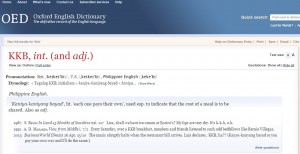“presidentiable,” “KKB,” “barkada” at “balikbayan” opisyal nang kasama sa English dictionary

INIHAYAG ng Oxford English Dictionary (OED) na opisyal nang kasama ang ilang kilalang salita na ginagamit sa Pilipinas.
“There are new senses of common English words like gimmick to mean ‘a night out with friends’; loanwords from Spanish (like estafa ‘fraud’) and Tagalog like barkada (‘group of friends’); and formations in English that are only used in Philippine English, like carnap (‘to steal a car’) and presidentiable (‘a person who is a likely or confirmed candidate for president’),” sabi OED.
Idinagdag ng OED na ginagamit ang mga salitang ito hindi lamang sa Pilipinas, kundi sa ibang bahagi ng Amerika na kung saan marami ang populasyon ng mga Pinoy.
Kabilang sa mga bagong salitang isinama sa English dictionary ay ang mga sumusunod:
barangay (noun): In the Philippines: a village, suburb, or other demarcated neighbourhood; a small territorial and administrative district forming the most local level of government. [First recorded 1840]
balikbayan (noun): A Filipino visiting or returning to the Philippines after a period of living in another country. [1976]
KKB (interjection): ‘Kaniya-kaniyang bayad’, literally ‘each one pays their own’, used especially to indicate that the cost of a meal is to be shared. It can also be used as an adjective. [1987]
high blood: (a) n.colloq. hypertension; (b) adj.Philippine English angry, agitated.
despedida (noun): More fully despedida party. A social event honouring someone who is about to depart on a journey or leave an organization; a going-away party. [1929]
halo-halo (noun): A dessert made of mixed fruits, sweet beans, milk, and shaved ice, typically topped with purple yam, crème caramel, and ice cream. [1922]
sari-sari store (noun): A small neighbourhood store selling a variety of goods. [1925]
utang na loob (noun): A sense of obligation to return a favour owed to someone. [1906]
“The June 2015 update of the OED includes a total of 40 words culled from Philippine usage of English,” sabi ni Danica Salazar, isang Pinoy na Consultant Editor ng OED.
“In this particular batch of Philippine English words, we made sure to have a balanced selection of items that show all the ways in which Filipinos have adapted English vocabulary to suit their communicative needs. Not just borrowings from Tagalog such as halo-halo, barangay and suki, but also hybrid expressions (balikbayan box, sari-sari store, kikay kit), derivations (presidentiable), compounds (batchmate), blends and clippings (mani-pedi), initialisms (KKB), loan translations (go down as in to get off a vehicle, a translation of Tagalog bumaba); conversions from one part of speech to another (adjectival use of noun phrase high blood), and even complete changes in meaning (gimmick, salvage),” ayon pa kay Salazar.
Disclaimer: The comments uploaded on this site do not necessarily represent or reflect the views of management and owner of Bandera. We reserve the right to exclude comments that we deem to be inconsistent with our editorial standards.


